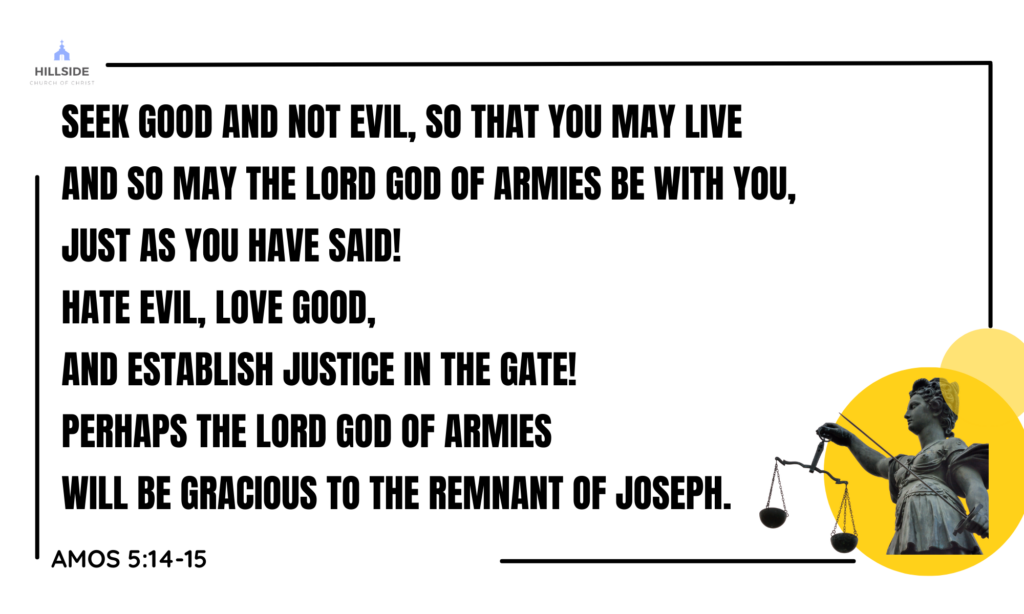At the time of this writing, we are about nine months removed from any New Year’s Resolutions that may or may not have been made.
If you’re like most people, reading your Bible may have been one of those resolutions.
If you’re still going with that, congratulations! No doubt you’re closer to God today than you were in 2022.
Don’t feel bad if you’ve fallen off the wagon though. Most people start out with great intentions, but some of those chapters in Leviticus are just tough.
The same can be said for the Minor Prophets. Dark, depressing, and loaded with imagery, Biblical prophecy can be a tough sell for most people. For that reason, even those who have read up until the book of Nahum, for example, usually find it a slog and drop out.
I think one of the main reasons for that is because it’s hard to take these things personal. The prophets were written for a certain group of people at a certain time, so what’s the appeal to me?
A Summary of Amos
Despite being written more than 2,000 years ago, Amos is remarkably similar to our time. For instance, the time period of Amos was one of:
- Great Prosperity. Jeroboam II, for all his evil deeds, greatly enlarged the material treasury of the kingdom. At least he had that going for him.
- Great Division. The Kingdom is divided. Judah is to the south, Amos travels north from there to Israel, to a people that doesn’t want or like him very much.
- Great Religiosity. The first king of Israel in the Divided Kingdom (Jeroboam) established golden calves at Dan and Bethel. Their religion went downhill from there.
- Great Security. If you look at Amos 1, you’ll see that Israel rests inside of a lot of other nations. All of them are just as secure and at ease as Israel is. All of that is about to change (Amos 1-2).
When Amos spoke out against Israel, he focused on one thing: their religion.
They believed that they worshipped God in a vacuum. In other words, they could come to worship, and as long as they followed most of the practices, their obligations were fulfilled and they could return home to do exactly what they wanted.
As we found out in Amos, that wasn’t what God thought.
What Did Amos Tell Israel?
Amos could tell the hypocrisy of Israel just like anyone else could. Their sins were not exactly an open secret, and when Amos was threatened to stop speaking, he told them as much.

Here are just a few of the things Amos told the people of Israel about their worship.
Your Mistreatment of Others Reflects on the Covenant
In Amos 2:6-8, Amos points out that the people of Israel have essentially leveraged their brethren in order to make a quick buck.
“This is what the Lord says: ‘For three offenses of Israel and for four, I will not revoke its punishment, because they sell the righteous for money, and the needy for a pair of sandals.”
(Acts 2:6)
If you’re starting out with a rebuke of people’s worship practices, it seems odd to jump on their treatment of other people. What’s the connection there?
What we miss sometimes about the nature of worship is that our glorification of God comes from an appreciation of His condescension to us. The fact that God would come to earth and save us from our sins — that He would even care about us in the first place — is remarkable.
When we fail to show that same type of love and mercy to our fellow man, it’s a slap in His face just like it is our victims’.
They viewed their religion as something to “do” so they could get back to living their life (Amos 8:4-10). They may not have noticed how their actions were hypocritical, but God certainly did.

Your False Humility Isn’t Fooling Anyone
Another thing that Israel failed to recognize was the blessings they had in even being loved by God to begin with. God didn’t have to love them, He chose to. Out of all the nations on earth, He chose them (Amos 3:1-2).
Do we appreciate that? When we don’t appreciate God’s blessings, our worship is hollow and meaningless. We end up just paying lip service and going through the motions of what we think we need to do, rather than genuinely, truly, worshipping God.
That’s the type of worship that makes God sick. It’s patronizing at best, and disrespectful at worst (Amos 5:21-24).
For those people who believed that Judgment Day would be their salvation, Amos informed them that they had another thing coming.
Seek the Core Values of Religion
What does it truly mean to be a disciple of God?
Is it following through with His commandments? Worshipping Him in the manner that He tells us to? Loving our brother as ourself?
All of the above — but done so with an eye towards justice.
These people needed a complete reset in their lives (Amos 5:14-15). Instead of seeing religion as a list of duties, they needed to pursue justice. They needed to make the unseen qualities of our Christianity the primary object of their life.

This type of plea is not unique to Amos.
- Isaiah 58:6 – “Is this not the fast I choose: To release the bonds of wickedness, to undo the ropes of the yoke, and to let the oppressed go free, and break every yoke?”
- Joel 2:13 – “‘Tear your heart and not merely your garments.’ Return to the Lord your God, for He is gracious and compassionate, slow to anger, abounding in mercy and relenting of catastrophe.”
- Micah 6:8 – “He has told you, mortal one, what is good; and what does the Lord require of you but to do justice, to love kindness, and to walk humbly with your God?”
God had tried several times to wake them up to this spiritual apathy that was so much a part of their life. He tried famine, drought, sickness, war, and everything else to get them to wake up (Amos 4:6-11).
Unfortunately, they stayed mechanical in their worship and carnal in their pursuits.
What Would Amos Say to Us?
If Amos were to walk into your assembly today, what would he say to you?
I imagine that it would be somewhat similar to what he told those people, but here are a few questions that I think would come up.
How do you treat others?
Does your worship come from the heart?
Are you going beyond songs and prayers?
When our worship becomes something that we do as a matter of obligation, rather than an outpouring of our love for Him, we’ve missed the point entirely. It doesn’t benefit us, and it insults God.
Like the people in Israel, we need to wake up and remember what God has done for us.
Last modified: September 7, 2023
